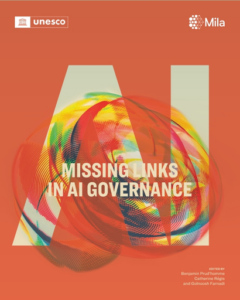Mila and UNESCO Join Forces to Emphasize Urgent Need for Better AI Governance
MONTREAL, March 20, 2023 -- Mila - Quebec Artificial Intelligence Institute and the United Nations Educational, Scientific and Cultural Organization (UNESCO) today unveiled at Mila a joint book on the urgent need for a better governance of artificial intelligence (AI) in the face of unprecedented technological change.
 The book, Missing Links in AI Governance, includes 18 articles on AI governance written by academics, civil society representatives, innovators and policy makers at a time when technological revolutions provide new scientific, economic and social opportunities while raising ethical questions and posing regulatory challenges.
The book, Missing Links in AI Governance, includes 18 articles on AI governance written by academics, civil society representatives, innovators and policy makers at a time when technological revolutions provide new scientific, economic and social opportunities while raising ethical questions and posing regulatory challenges.
The book explores themes such as the influence of AI on indigenous and LGBTI communities, the necessary inclusion of Southern countries in global governance or the use of AI to support innovation for socially beneficial purposes. It maps out possible solutions to foster an AI development that is ethical, inclusive, and respectful of human rights.
The authors also warn against the use of AI in potentially harmful contexts like autonomous weapons or the manipulation of digital content for social destabilization, deplore the increasing centralization of decision-making power in the development of AI systems and biases embedded in them, and the lack of transparency and accountability in the industry.
Valerie Pisano, President and CEO of Mila, stated: "We are very proud to unveil this book at a critical time in the development of AI. The choices we make as a society over the next few years will have a significant influence on the future of humanity, and we hope that these pages will provide food for thought and guide decisions to ensure a more ethical, responsible and inclusive technological development."
The book is available for download here.
To celebrate the launch, Mila today hosted a conversation in its Agora between two leading voices in the field of AI who contributed to the book: Yoshua Bengio, professor at the University of Montreal, founder and scientific director of Mila, scientific director of IVADO and Canada CIFAR AI Chair, and Kate Crawford, Research Professor at the University of Southern California Annenberg, Senior Principal Researcher at Microsoft Research and a leading expert on social, political and environmental impacts of artificial intelligence.
They discussed the great potential of AI to accelerate scientific discovery, especially in healthcare and environmental sciences. They also addressed the opportunities of recent technological revolutions, the pitfalls and biases of current AI systems and the need for ethical and regulatory oversight of the field to ensure that the technology serves humanity as a whole.
This conversation on the present and future of AI was preceded by speeches from representatives of UNESCO and the Quebec government. A retransmission is available on Mila's YouTube channel.
This initiative was partially funded by the Ministère des Relations internationales et de la Francophonie du Québec and the Fonds de recherche du Québec.
For more information about Mila, visit mila.quebec.
For more information about UNESCO, visit unesco.org.
About Mila
Founded by Professor Yoshua Bengio of the University of Montreal, Mila is an artificial intelligence research institute that brings together nearly 900 researchers specializing in machine learning. Based in Montreal, Mila’s mission is to be a global hub for scientific advances that inspire innovation and development of AI for the benefit of all. Mila is a non-profit organization recognized worldwide for its significant contributions to the field of deep learning, particularly in language modeling, machine translation, object recognition, and generative models. For more information, visit mila.quebec.
Source: Mila










